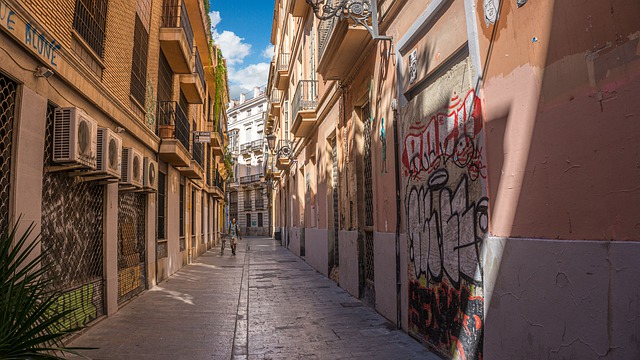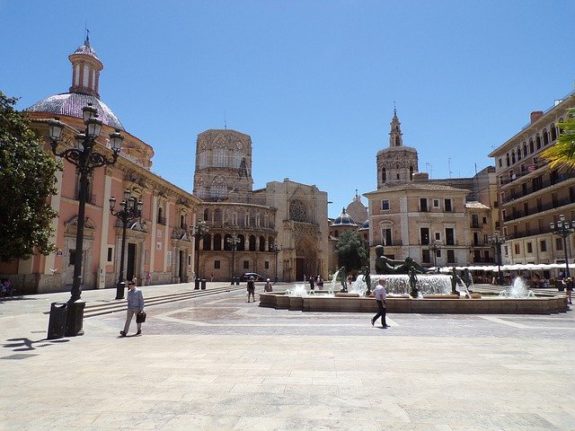Use the Valenbisi system to get around
Valencia is a great city for cycling, especially along the Turia Gardens that surround the Old Town, but there’s no need to bring your own bicycle when you move here, which can often take up a lot of space in small apartments. Instead, you can use the Valenbisi system, where you’ll have a bike available to you 24 hours a day and 365 days a year. Find out how to sign up for the subscription here.
Learn Spanish first and then Valencian
There are two official languages in Valencia – Spanish (Castellano) and Valencian. Valencian is a dialect of Catalan, which is a separate language from Spanish. Because of this, you may be wondering which language you should learn first. We recommend mastering a decent amount of Spanish first, before attempting to learn Valencian. This is because only 1.3 percent of people in Valencia city regularly speak in Valencian, according to a 2019 city hall survey. Locals prioritise the use of Spanish in 76 percent of cases, even though the city has two co-official languages. According to Spain’s National Statistics Institute (INE) 35.2 percent of people in the Valencia region speak Valencian as their mother tongue. Unlike in neighbouring Catalonia, children in schools in the region are not taught in the local language, but in Spanish.
READ ALSO: Do I need to learn Valencian if I live in Spain’s Valencia region?
Don’t buy single transport tickets
Don’t bother buying single tickets for Valencia’s transport system, which includes buses, metro lines and trams. Instead, save money by buying the Bono Transbordo ticket for 10 journeys. For Zone 1, it costs just €7.60. In 2023, there are other offers to take advantage of, such as free public transport for under-30s, and free mid-distance trains.
READ ALSO: How much does it really cost to live in Spain’s Valencia?
Make a plan during Las Fallas
Las Fallas is without a doubt Valencia’s most exciting and craziest festival, and while it’s great fun, it can also cause a lot of disruption to your daily life. Some locals even try to get away during this time. The festival lasts for around 19 days, with the majority of the festivities take place over five days from March 15th to the 19th. From March 1st, thunderous firecrackers called the mascletà are set off every day at 2pm in the Plaza del Ayuntamiento, meaning that if you live or work anywhere in the Old Town, you’ll be able to hear it every day. Similarly, if you live anywhere in central Valencia, you’ll end up getting very little sleep for the five main days of the festival, with fireworks and firecrackers being let off at any time of the day or night. The central areas are also very crowded during this time.
The best thing is to make a plan to decide what you’ll do during this time – do you want to leave the city and spend the week somewhere quiet? Do you want to find some accommodation on the city outskirts? Or do you want to become full Valencian, book some time off work and revel in full party mode, even if it means little to no sleep for the week?
READ MORE: Everything you need to know about Valencia’s Las Fallas festival
Join groups to make friends and stay connected
Like many big cities in Spain, Valencia attracts many foreign residents, digital nomads and travellers. This means that it’s a very transient city with people moving here and moving away very frequently. Because of this, and the fact that many foreign residents work remotely online or as freelancers, making friends and staying connected can be tricky. It’s a great idea to join groups to meet both locals and foreigners, especially if you’re working at home by yourself all day. One of the most popular groups in the city to meet others that also work online is Coffees & Co-Working.

Make use of the Valencia metro system to explore further
Many people find when they first move to Valencia that they’re walking most of the time and perhaps using the buses or trams to get to the beach, however, the Valencia metro system is very easy to use and will enable you to explore a much wider area, including outer-lying neighbourhoods, as well as nearby towns and villages.
Make time to go to the beach
This may sound obvious because the beach was probably one of the main things that attracted you to Valencia in the first place, but you’ll find that if you don’t take the time, you won’t visit the beach nearly as much as you’d planned to. This is mainly because the beach is just under one hour’s walk from the centre and is quite disconnected from the rest of the city. Playa de las Arenas is the closest beach to the centre, but remember to make use of the whole stretch to get away from the crowds.
READ ALSO: Valencia named best city in the world for foreign residents in 2022
Make sure you choose a neighbourhood that suits your lifestyle
Valencia is a compact city and you can generally walk everywhere in the central areas, but it’s still important to choose a neighbourhood to live in that suits you. Perhaps you want to live in hipster Ruzafa or close to the beach in El Cabanyal, or maybe you want to experience the quiet village-like feel in Benimaclet. Read our guide on the best neighbourhoods to live in Valencia to help you decide.
Rent via an agency rather than privately
If you’re new to the city and don’t yet speak Spanish very well, it’s better to rent an apartment via an agency rather than privately from a landlord. This is because you’ll often find private rental ads that sound too good to be true, and this is because they often are. Rental scams are growing in the city and even though an agency will charge you more, it’s safer and you’re less likely to fall victim to a scam. Many landlords don’t speak English very well either and agencies can often help you navigate the language barriers if you’re not that confident yet.
Take advantage of the menú del día
It’s common in Spain for restaurants to serve menus of the day at lunchtimes, offering a choice of starters, mains and sometimes desserts for a set price. While sometimes in some Spanish cities, these menus are not always of great quality, in Valencia you’ll find that the majority of them are and many cost less than €12. As well as the typical Spanish restaurants offering these deals, in Valencia, you’ll find everything from Italian to sushi restaurants offering a menú del día.
Escape the city in August
Like many cities in Spain, Valencia shuts down for the month of August. It’s very hot and in normal years, the city is crowded with tourists. Most locals escape to the beach or the mountains during this time to keep cool and stay away from the crowds. It’s also impossible to get anything done in August, with many official offices and businesses taking holidays for most of the month. Do like the locals do and find a small coastal town or village to escape to.
READ ALSO: Seven essential apps that make life in Valencia easier for foreign residents



 Please whitelist us to continue reading.
Please whitelist us to continue reading.
Member comments